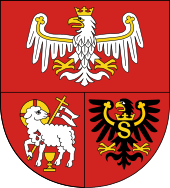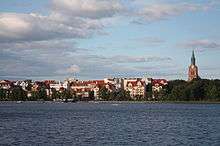Warmian-Masurian Voivodeship
| Warmian-Masurian Voivodeship | |||
|---|---|---|---|
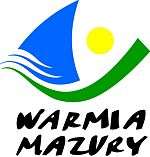 | |||
| |||
.png) Location within Poland | |||
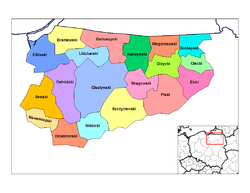 Division into counties | |||
| Coordinates (Olsztyn): 53°47′N 20°30′E / 53.783°N 20.500°E | |||
| Country |
| ||
| Capital | Olsztyn | ||
| Counties |
2 cities, 19 land counties *
| ||
| Area | |||
| • Total | 24,191.8 km2 (9,340.5 sq mi) | ||
| Population (31-12-2014) | |||
| • Total | 1,443,967 | ||
| • Density | 60/km2 (150/sq mi) | ||
| • Urban | 856,559 | ||
| • Rural | 570,532 | ||
| Car plates | N | ||
| Website | Official Voivodeship's website | ||
| |||
Warmian-Masurian Voivodeship or Warmia-Masuria Province[1] or Warmia-Mazury Province (in Polish: Województwo warmińsko-mazurskie, [[Help:IPA/Polish|[vɔjɛˈvut͡stfɔ var]]ˈmiɲskɔ maˈzurskʲɛ], Russian: Варминьско-Мазурское воеводство), is a voivodeship (province) in northeastern Poland. Its capital and largest city is Olsztyn. The voivodeship has an area of 24,192 km2 (9,341 sq mi) and a population of 1,427,091 (as of 2006).
The Warmian-Masurian Voivodeship was created on January 1, 1999, from the entire Olsztyn Voivodeship, the western half of Suwałki Voivodeship and part of Elbląg Voivodeship, pursuant to the Polish local government reforms adopted in 1998. The province's name derives from two historic regions, Warmia and Masuria. It is also the southern half of the pre-World War II German region of East Prussia.
The province borders the Podlaskie Voivodeship to the east, the Masovian Voivodeship to the south, the Kuyavian-Pomeranian Voivodeship to the south-west, the Pomeranian Voivodeship to the west, the Vistula Lagoon to the northwest, and the Kaliningrad Oblast (an exclave of Russia) to the north.
History
The region was originally inhabited by the Old Prussian clans of the Warmians from whom the name Warmia hence from and the Galindians in Masuria. During the northern Crusade, the Old Prussians was conquered by the Teutonic Order and their land was granted to the order by the pope and the region became part of theState of the Teutonic Order. The Order encouraged the colonization by German settlers in Warmia (Ostsiedlung) and Slavic colonists from the region of Masovia from which the name Masuria hence from, and the Old Prussians became assimilated into the newcomers. During the Order rule, the region experienced a process of urbanization and economic boost due to the expansion of the Hanseatic league into the region. The Order later attacked their former ally Poland and conquered the region of Pomerelia from Poland and thus entered a long-lasting conflict with Poland who later entered an alliance with Lithuania who had been in conflict with the Order since the northern crusade. The war finally resulted in a rebellion of the urban population of Pommerelia and Warmia, who were no longer willing to pay for the orders wars, they accepted polish overlordship became an autonomous province of Poland-Lithuania known as Royal Prussia, while Masuria remains under the control of the Teutonic order. The conflict between Poland and the order finally ended in favor of Poland after the orders defeat at the Battle of Grünwald, the order state ceased to exist in 1525 when Grandmaster Albert of House of Hohenzollern secularised the state, proclaimed the Duchy of Prussia and became a vassal of Sigismund of Poland. The Prussian line of Hohenzollern extinct in 1618 with the death of Albert Frederick and the duchy was inherited by the brandenburgian line and Prussia entered a personal union with the electorate of Brandenburg known as Brandenburg-Prussia. The throne was inherited by Frederic I of Prussian who wanted to unite the Duchy with Brandenburg and also wanted to proclaim himself king of Prussia and therefore participated in the Russian-initiated Partition of Poland in which the province of Royal Prussia was annexed by the Kingdom of Prussia, unlike the most of the region, which became part of West Prussia, Warmia was reunited with the Duchy of Prussia and formed the Province of East Prussia. Together with the rest of the Kingdom, the region became part of the North German Confederation, the German Empire, the Weimar Republic, and Nazi Germany. After the end of World war two, both the German as well as the Slavic Masurian population were expelled by the Polish government and the area was de facto annexed by Poland.
Amongst the most visited sights is the Masurian Lake District, which contains more than 2,000 lakes, including the largest lakes of Poland, Śniardwy and Mamry. Other recognizable landmarks are the Warmian castles (Lidzbark Warmiński Castle, Pieniężno Castle, Olsztyn Castle) and the Cathedral Hill in Frombork, where German-Polish astronomer Nicolaus Copernicus lived and worked. The Lidzbark Warmiński Castle was later the residence of Ignacy Krasicki, nicknamed the Prince of Polish Poets. Święta Lipka in Masuria and Gietrzwałd in Warmia are popular pilgrimage sites.
The Warmian-Masurian Voivodeship has the largest number of ethnic Ukrainians living in Poland[2] due to forced relocations (such as Operation Vistula) carried out by the Soviet and Polish Communist authorities.
Cities and towns
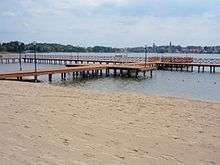

The Voivodeship contains 49 cities and towns. These are listed below in descending order of population (according to official figures for 2006):[3]
- Olsztyn (176,522)
- Elbląg (127,055)
- Ełk (56,156)
- Ostróda (33,419)
- Iława (32,326)
- Giżycko (29,667)
- Kętrzyn (28,000)
- Szczytno (25,680)
- Bartoszyce (25,423)
- Mrągowo (21,772)
- Działdowo (20,824)
- Pisz (19,332)
- Braniewo (17,875)
- Lidzbark Warmiński (16,390)
- Olecko (16,169)
- Nidzica (14,761)
- Morąg (14,497)
- Gołdap (13,641)
- Pasłęk (12,179)
- Węgorzewo (11,638)
- Nowe Miasto Lubawskie (11,036)
- Dobre Miasto (10,489)
- Biskupiec (10,348)
- Orneta (9,380)
- Lubawa (9,328)
- Lidzbark (8,261)
- Olsztynek (7,591)
- Barczewo (7,401)
- Orzysz (5,804)
- Susz (5,733)
- Reszel (5,098)
- Ruciane-Nida (4,894)
- Korsze (4,632)
- Górowo Iławeckie (4,554)
- Biała Piska (4,006)
- Mikołajki (3,848)
- Jeziorany (3,376)
- Ryn (3,006)
- Pieniężno (2,915)
- Tolkmicko (2,731)
- Miłakowo (2,665)
- Pasym (2,550)
- Frombork (2,529)
- Bisztynek (2,493)
- Miłomłyn (2,305)
- Kisielice (2,208)
- Zalewo (2,152)
- Sępopol (2,015)
- Młynary (1,837)
Administrative division
Warmian-Masurian Voivodeship is divided into 21 counties (powiats): 2 city counties and 19 land counties. These are further divided into 116 gminas.
The counties are listed in the following table (ordering within categories is by decreasing population).
| English and Polish names |
Area (km²) |
Population (2006) |
Seat | Other towns | Total gminas |
| City counties | |||||
| Olsztyn | 88 | 176,522 | 1 | ||
| Elbląg | 80 | 127,055 | 1 | ||
| Land counties | |||||
| Olsztyn County powiat olsztyński |
2,840 | 113,529 | Olsztyn * | Dobre Miasto, Biskupiec, Olsztynek, Barczewo, Jeziorany | 12 |
| Ostróda County powiat ostródzki |
1,765 | 105,286 | Ostróda | Morąg, Miłakowo, Miłomłyn | 9 |
| Iława County powiat iławski |
1,385 | 89,960 | Iława | Lubawa, Susz, Kisielice, Zalewo | 7 |
| Ełk County powiat ełcki |
1,112 | 84,760 | Ełk | 5 | |
| Szczytno County powiat szczycieński |
1,933 | 69,289 | Szczytno | Pasym | 8 |
| Kętrzyn County powiat kętrzyński |
1,213 | 66,165 | Kętrzyn | Reszel, Korsze | 6 |
| Działdowo County powiat działdowski |
953 | 65,110 | Działdowo | Lidzbark | 6 |
| Bartoszyce County powiat bartoszycki |
1,309 | 61,354 | Bartoszyce | Górowo Iławeckie, Bisztynek, Sępopol | 6 |
| Pisz County powiat piski |
1,776 | 57,553 | Pisz | Orzysz, Ruciane-Nida, Biała Piska | 4 |
| Giżycko County powiat giżycki |
1,119 | 56,863 | Giżycko | Ryn | 6 |
| Elbląg County powiat elbląski |
1,431 | 56,412 | Elbląg * | Pasłęk, Tolkmicko, Młynary | 9 |
| Mrągowo County powiat mrągowski |
1,065 | 50,087 | Mrągowo | Mikołajki | 5 |
| Braniewo County powiat braniewski |
1,205 | 43,781 | Braniewo | Pieniężno, Frombork | 7 |
| Nowe Miasto County powiat nowomiejski |
695 | 43,388 | Nowe Miasto Lubawskie | 5 | |
| Lidzbark County powiat lidzbarski |
924 | 43,006 | Lidzbark Warmiński | Orneta | 5 |
| Olecko County powiat olecki |
874 | 34,215 | Olecko | 4 | |
| Nidzica County powiat nidzicki |
961 | 33,955 | Nidzica | 4 | |
| Gołdap County powiat gołdapski |
772 | 26,989 | Gołdap | 3 | |
| Węgorzewo County powiat węgorzewski |
693 | 23,641 | Węgorzewo | 3 | |
| * seat not part of the county | |||||
Protected areas
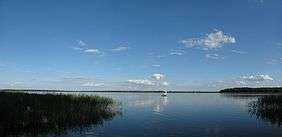
Protected areas in Warmian-Masurian Voivodeship include eight areas designated as Landscape Parks, as listed below:
- Brodnica Landscape Park (partly in Kuyavian-Pomeranian Voivodeship)
- Dylewo Hills Landscape Park
- Elbląg Upland Landscape Park
- Górzno-Lidzbark Landscape Park (partly in Kuyavian-Pomeranian and Masovian Voivodeships)
- Iława Lake District Landscape Park (partly in Pomeranian Voivodeship)
- Masurian Landscape Park
- Puszcza Romincka Landscape Park
- Wel Landscape Park
The Łuknajno Lake nature reserve (part of Masurian Landscape Park) is a protected wetland site under the Ramsar convention, as well as being designated by UNESCO as a biosphere reserve.
International relations
Twin towns – sister cities
The Warmian-Masurian Voivodeship is twinned with:
Gallery
- Popular attractions and tourist destinations
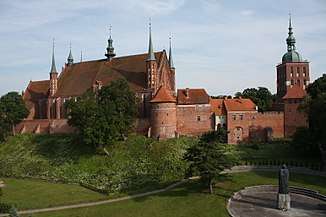
- The Lidzbark Warmiński Castle is considered to be a great artistic and historical value in the world
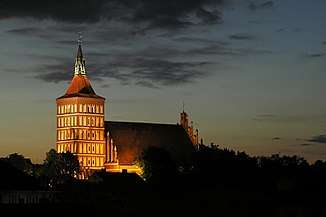 St. James' Cathedral in Olsztyn
St. James' Cathedral in Olsztyn- Reszel historic city center
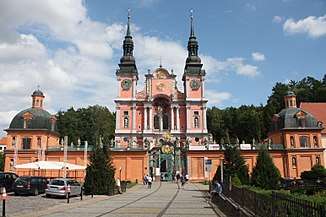 Sanctuary of Saint Mary in Święta Lipka
Sanctuary of Saint Mary in Święta Lipka- Palace in Smolajny, former summer residence of Ignacy Krasicki
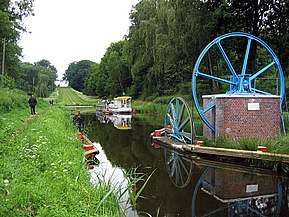
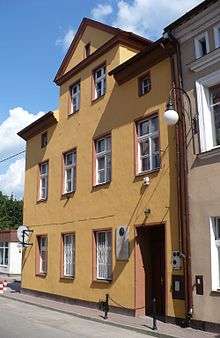 Birthplace of composer Feliks Nowowiejski in Barczewo
Birthplace of composer Feliks Nowowiejski in Barczewo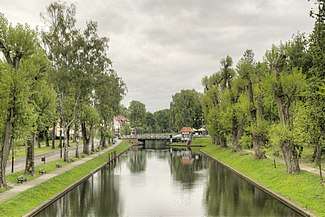 Łuczański Canal and the swing bridge in Giżycko
Łuczański Canal and the swing bridge in Giżycko
See also
References
- ↑ Arkadiusz Belczyk,Tłumaczenie polskich nazw geograficznych na język angielski [Translation of Polish Geographical Names into English], 2002-2006.
- ↑ (in Polish) Mniejszości narodowe i etniczne w Polsce on the pages of Polish Ministry of Internal Affairs and Administration. Retrieved on 9 September 2007
- ↑ Stat.gov.pl
- ↑ "Podolsk sister cities". Translate.google.com. Retrieved 2010-04-29.
External links
| Wikimedia Commons has media related to Warmińsko-Mazurskie. |

